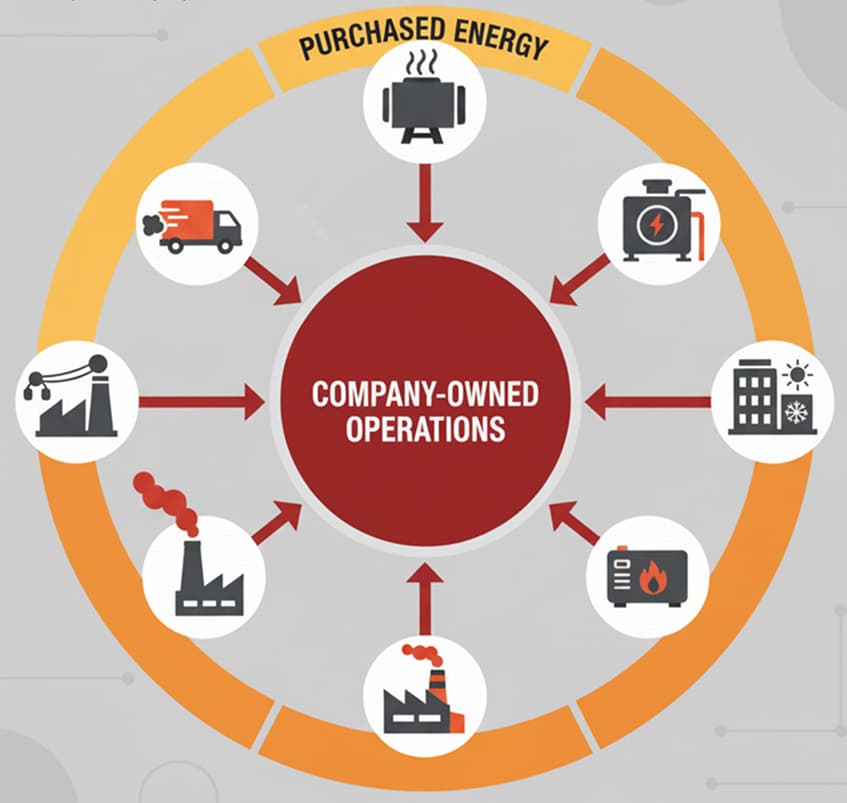Tech Companies Achieving Zero Scope 2

Leading the Corporate Renewable Energy Transition
Technology companies have emerged as pioneers in corporate renewable energy adoption, with many achieving or committing to 100% renewable electricity years ahead of other sectors. Their combination of high energy consumption, financial resources, and sustainability ambitions positions them as both major energy users and solution innovators.
The Tech Sector's Unique Position
Technology companies face distinctive Scope 2 challenges stemming from their operational characteristics: massive data center operations requiring 24/7 reliability, globally distributed office networks, rapid growth trajectories that can double energy consumption in years, and public scrutiny as visible brands with environmental commitments.
Energy Intensity: While tech companies may seem less energy-intensive than manufacturing, their data centers, R&D facilities, and extensive office networks create substantial electricity demands. Major tech companies rank among the largest corporate electricity consumers globally.
Pioneering Procurement Strategies
Large-Scale PPAs: Tech companies pioneered the corporate PPA market, signing multi-hundred megawatt agreements that finance new renewable projects. These long-term contracts provide price certainty while adding renewable capacity to grids.
24/7 Carbon-Free Energy: Leading tech companies are advancing beyond annual matching to ensure every hour of consumption matches carbon-free generation. This requires sophisticated procurement combining wind, solar, storage, and other clean sources.
Investment in New Technologies: Tech companies invest directly in emerging renewable technologies like floating solar, offshore wind, and next-generation storage, accelerating commercialization.
Global Renewable Strategies: With operations worldwide, tech companies navigate diverse energy markets, regulatory frameworks, and renewable availability, developing region-specific approaches while maintaining global targets.
Innovation in Energy Management
AI-Powered Optimization: Machine learning algorithms optimize energy consumption across data centers and offices, predicting demand, adjusting cooling, and shifting workloads to match renewable availability.
Circular Economy Approaches: Extending hardware lifecycles, improving recycling, and designing for efficiency reduces embedded energy and associated Scope 2 emissions from manufacturing.
Software Efficiency: Optimizing code, improving algorithms, and efficient system architecture can dramatically reduce computational energy requirements, addressing Scope 2 at the source.
Distributed Computing: Edge computing and efficient content delivery networks reduce transmission losses and enable better renewable matching through geographic distribution.
Overcoming Tech-Specific Challenges
Rapid Growth Management: Tech companies often grow faster than renewable energy can be deployed. Solutions include advanced procurement planning, investing in project development, and temporary use of high-quality certificates.
Reliability Requirements: Critical services require uninterrupted power. Approaches include redundant renewable sources, advanced storage systems, and sophisticated grid integration.
Scope Boundary Complexity: Cloud services, co-location facilities, and shared infrastructure create attribution challenges. Clear accounting methodologies and standards help ensure accurate reporting.
Supply Chain Integration: Tech manufacturing relies on energy-intensive suppliers. Leading companies work with suppliers on renewable adoption and provide technical assistance.
Strategic Implementation Framework
- Comprehensive Baseline: Map all energy consumption across data centers, offices, and facilities globally
- Ambitious Target Setting: Commit to 100% renewable electricity with interim milestones and 24/7 matching goals
- Procurement Portfolio: Develop diversified approach combining on-site generation, PPAs, green tariffs, and certificates
- Efficiency First: Maximize efficiency before adding renewable capacity
- Innovation Investment: Fund emerging technologies and market development
- Transparency Leadership: Report detailed progress and share learnings publicly
- Policy Advocacy: Support policies enabling renewable energy expansion
Market Transformation Impact
Tech companies' renewable energy commitments have catalyzed broader market transformation by creating demand that drives renewable project development, demonstrating feasibility of 100% renewable operation, developing innovative procurement mechanisms adopted by other sectors, and advocating for supportive policies and grid modernization.
Beyond Direct Operations
Leading tech companies extend Scope 2 efforts beyond their own operations through supplier engagement programs requiring renewable adoption, customer tools enabling users to track and reduce their carbon footprints, and investment in renewable energy projects benefiting broader communities.
Financial and Business Benefits
Tech companies' Scope 2 initiatives deliver substantial returns including long-term energy cost stability through PPAs, enhanced brand value and customer loyalty, talent attraction and retention advantages, risk mitigation against carbon pricing and regulations, and operational resilience through diversified energy sources.
Emerging Trends and Future Directions
Carbon-Aware Computing: Dynamically shifting computational workloads based on grid carbon intensity in real-time.
Green Software Development: Industry initiatives promoting energy-efficient coding practices and sustainable software design.
Renewable Energy as a Service: Tech companies offering renewable energy procurement expertise to customers and partners.
Next-Generation Technologies: Investment in fusion, advanced geothermal, and other breakthrough energy technologies.
Lessons for Other Industries
Tech companies' success in achieving zero Scope 2 emissions provides valuable lessons: early action creates competitive advantage, ambitious targets drive innovation, collaboration accelerates progress, and transparency builds trust and accountability. Their experience demonstrates that 100% renewable electricity is achievable for complex global operations while maintaining growth and reliability.
